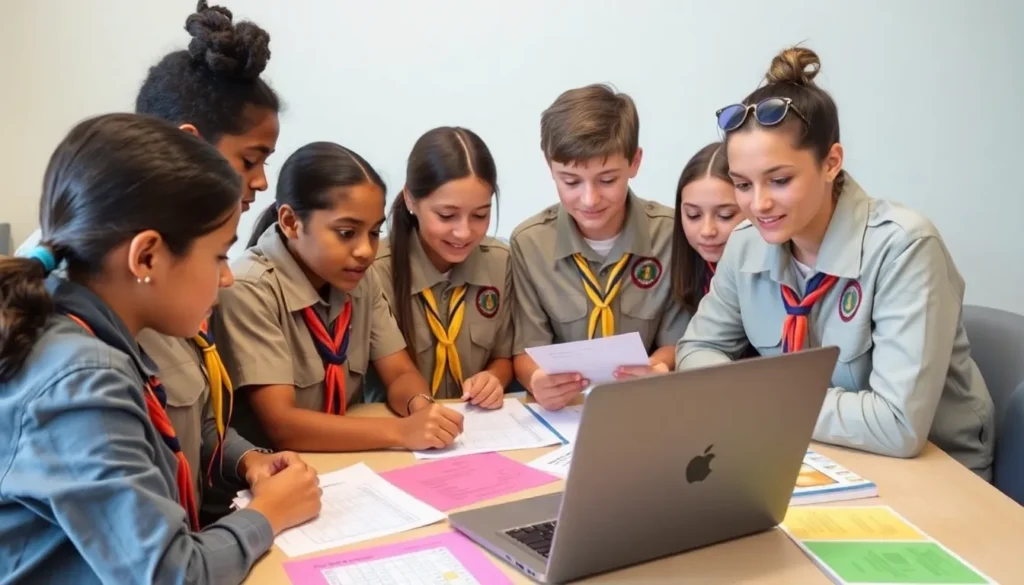Earning a personal finance merit badge might sound like a task straight out of a scout handbook, but it’s more than just a shiny piece of fabric. It’s a ticket to financial freedom and smart money moves that could save someone from becoming a future contestant on “Who Wants to Be Broke?” In today’s world, mastering personal finance isn’t just a good idea; it’s practically a superpower.
Imagine confidently navigating the wild terrain of budgeting, saving, and investing while your friends struggle with their wallets like they’re trying to tame a wild beast. With the personal finance merit badge, he or she won’t just learn the ropes; they’ll become the financial guru of their circle. So why wait? Let’s dive into the essentials that’ll transform anyone from a financial novice to a money-savvy master.
Table of Contents
ToggleOverview of Personal Finance Merit Badge
The Personal Finance Merit Badge equips participants with crucial financial skills. Earning this badge entails understanding budgeting, saving, investing, and debt management. Scouts learn to create a personal budget that reflects income and expenses, promoting responsible spending habits.
Budgeting activities emphasize tracking expenses and setting saving goals. Concepts like emergency funds and retirement planning come into focus as scouts examine their financial futures. Understanding the impact of interest rates and inflation features prominently in discussions about saving and investing.
Strategies for effective money management form another cornerstone of this merit badge. Practical exercises involve researching financial products like bank accounts, savings accounts, and different investment options. Participants explore the advantages and disadvantages of each option, helping them make informed decisions.
During the earning process, scouts may engage in community service projects related to financial literacy. Collaborating with organizations furthers their understanding of economic issues, promoting responsible financial behavior within their communities. As they progress, participants receive mentorship opportunities, fostering guidance from experienced individuals.
Completion of the Personal Finance Merit Badge leads to increased financial confidence. Participants gain skills applicable to real-world situations, preparing them for a future of financial independence. This structured program instills a sense of responsibility and empowerment, essential for navigating today’s financial landscape.
Importance of Personal Finance Skills


Personal finance skills play a crucial role in achieving financial independence. Mastering these skills early sets individuals on a path to responsible money management.
Financial Literacy for Youth
Financial literacy empowers youth to make informed decisions. Understanding budgeting and saving instills a sense of responsibility. They learn to track expenses and set financial goals through engaging activities. Investments and debt management concepts further enhance their skills. Community projects reinforce these lessons, allowing them to apply knowledge in real-world situations. Mentoring fosters confidence, helping them navigate economic challenges effectively.
Long-Term Benefits of Learning Finance
Learning finance offers significant long-term advantages. Individuals build a foundation for sound financial habits they carry into adulthood. Effective budgeting and saving enable stronger financial security. Knowledge of investing increases potential for wealth accumulation over time. Awareness of credit management and debt repayment leads to improved financial health. Furthermore, understanding economic principles enhances critical thinking, benefiting both personal and communal aspects of life. Developing these skills early cultivates habits that contribute to lasting economic stability.
Requirements for Earning the Merit Badge
Earning the Personal Finance Merit Badge requires dedication and a commitment to learning essential financial skills. Participants engage in activities that enhance their understanding of money management and its significance.
List of Skills and Knowledge Areas
Participants gain knowledge in budgeting, savings, and investing. Skills include tracking expenses, managing debt, and setting financial goals. Participants learn about creating personal budgets that align with their income and expenditures. Understanding concepts such as interest rates, inflation, and emergency funds provides a solid financial foundation. Familiarity with various financial products also aids effective money management.
Steps to Complete the Badge
Completing the Personal Finance Merit Badge involves several steps. First, participants should attend informational sessions focusing on personal finance principles. Next, creating a detailed budget showcases their understanding of income and expenses. Engaging in community service projects related to financial literacy fosters practical experience. Participants might also seek mentorship from experienced individuals to enhance learning. Finally, presenting their insights and experiences solidifies their newfound financial skills.
Resources for Learning Personal Finance
Accessing quality resources enhances the journey toward mastering personal finance. Numerous options exist to equip learners with essential financial skills.
Recommended Books and Online Courses
Various books provide comprehensive insights into personal finance principles. “The Total Money Makeover” by Dave Ramsey offers practical guidance on budgeting and debt elimination. Additionally, “Rich Dad Poor Dad” by Robert Kiyosaki teaches the value of financial education and investing. Online platforms like Coursera and Udemy feature courses designed for beginners, covering topics such as saving, investing, and retirement planning. Participants gain valuable skills through engaging video lectures and interactive quizzes, allowing them to learn at their own pace.
Community Workshops and Financial Advising
Local community centers often host workshops on personal finance topics, creating opportunities for hands-on learning. These workshops typically feature financial experts who share knowledge on managing budgets and investing wisely. Moreover, many nonprofit organizations offer free financial advising services, where individuals receive tailored advice from professionals. Engaging with these resources can lead to improved financial habits and greater confidence in making money decisions. Participants benefit from real-life examples, enabling them to apply skills directly to their own financial situations.










